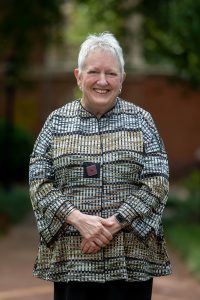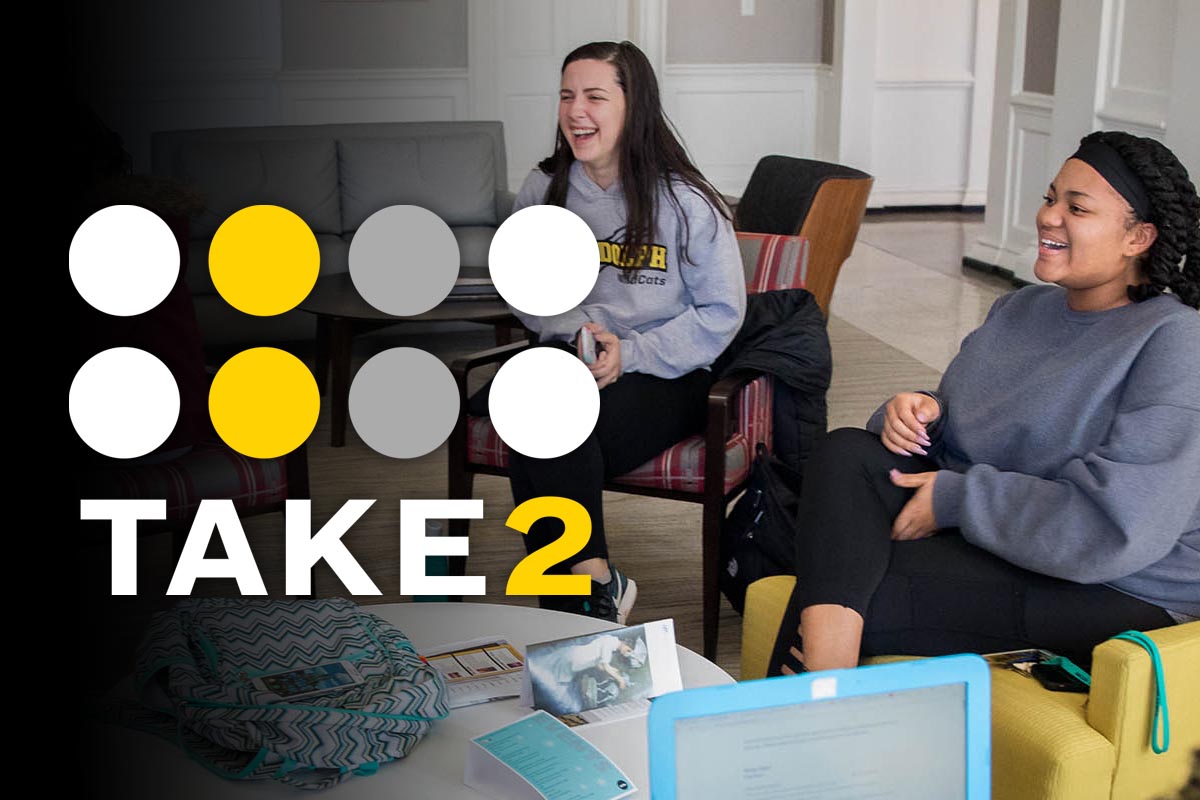A conversation with President Sue Ott Rowlands

Sue Ott Rowlands, Randolph College’s 11th President
Sue Ott Rowlands, Randolph’s 11th president, began her tenure July 1. She brings a wealth of experience and background in teaching and administration, with a keen focus on, and a successful track record with, student success.
Ott Rowlands previously served as provost and executive vice president for academic affairs at Northern Kentucky University, where she was also a professor of theatre arts. Prior to her tenure at NKU, Ott Rowlands was the dean of the College of Liberal Arts and Human Sciences at Virginia Tech and interim dean of the College of Arts and Sciences, as well as professor and chair of the Department of Theatre and Film at the University of Toledo in Ohio. She has also served as chair of The Ohio State University’s acting/directing program in the Department of Theatre and head of the acting program at Webster University in St. Louis.
Keep reading to learn a little more about Randolph’s newest president.
Tell us a little about yourself.
I was born and raised in Oklahoma, in a relatively small town. I went to undergraduate and graduate school in Oklahoma, and then I left that state and have traveled around due to my jobs, since the late 70s. I’ve lived in quite a number of places, from St. Louis to New York, Cleveland to Washington. This is my second time in Virginia, after having been at Virginia Tech for six and a half years a few years ago. So I’ve really enjoyed returning to Virginia. I like it here, and I love living here.
I have two daughters. My oldest daughter lives in Charlottesville. She’s married and they have six children, so I have six grandkids. It’s a very busy household. The oldest two are now in college, and the other four still live at home. My younger daughter lives in Seattle and she and her husband and their dog live right on the water outside of Seattle. They love it there.
I spend a lot of time traveling to see, not just my daughters, but my sisters as well. And I love traveling in general. I travel overseas several times a year usually, and I try to go as often as I can.
Why do you like traveling?
I’ve learned so much as I’ve traveled. I meet people. I experience different traditions, cultures, and food. I’ve been to almost 60 countries and just adore it. It fills my soul. I want our students to travel also, so it’s really important to me that we get them out of their comfort zones and challenge them in ways that international travel does. It’s also important that we bring international students here to broaden our own community.
What are your favorite places?
I tend to return to Sri Lanka quite a lot. I love Sri Lanka, have a lot of good friends there, and I know the country very well. I’ve also always loved Morocco, Turkey, and Vietnam.
What attracted you to Lynchburg?
I think the size of the town is very familiar to me. It’s a little bigger than where I grew up, but it’s a medium-sized city. I like the fact that everyone I’ve met who lives here loves it. I enjoy the burgeoning restaurant scene—that’s a lot of fun. I love the fact that the arts are very prevalent here, and that people are very welcoming. They’ve been just terrific in wanting me to get to know the town, introducing me to people, and trying to get me connected. I appreciate that hospitality and that warmth of the welcome.
What makes Randolph distinctive from other schools?
Everyone says they have a close-knit community, but what I have found is that this community manifests itself in a very palpable sense of caring, of support, of people greeting each other in the halls and on the sidewalks. Everyone says hello when you walk by. People know each other’s names. Staff are very caring about the students. Faculty are very engaged; we know that from the recent ranking of the 12th most accessible faculty in the country. There’s real evidence that the community here at Randolph is something special. It’s tangible. There’s a pride in being within the Red Brick Wall, a pride in being part of this community.
The fact that we have an innovative curriculum model makes Randolph unique. There are not very many places in the country where you’ll find something that sort of disturbs the semester model, the traditional model for higher education. Students tell me they come here for TAKE2, that that’s what attracted them and drew them.
It’s unique that it was designed, developed, and implemented purely by the faculty. It wasn’t a top-down program in any way, and that is incredibly unique. It speaks to innovation, which I think is another thing that makes Randolph special. This is a very innovative place, and TAKE2 is evidence of that. Another piece of evidence is the low-residential master’s program in creative writing and, the newest, soon to be in theatre.
The fact that our history was as a woman’s college, and 15 years ago, we transitioned to coeducation also makes us very unique and very special. The way that manifests itself in our day-to-day life here is that we have brought traditions from our time as a woman’s college that still are cherished today, but we also love our male students and really appreciate the richness of the coeducational environment. We look toward the future while honoring our past.
What are the College’s strengths?
Our people, first of all. The faculty are all incredibly talented, and they have the courage to innovate and to be creative with teaching modalities. You can tell how wonderful they are by looking at their credentials, their research, and what students say about their classes.
The dedication of the staff is also one of our great strengths. They have a commitment to Randolph that is evidenced by how long many of them have been here, how close they are to the students, and how the students know and care about them, as well.
And then our students. I describe them as feisty a lot of the time because they are. They’re sassy, they’re smart, they’re bright. I walk into the dining hall, and their faces are just so alive. They brighten this place.
So I would say one of the big strengths is our people. The history of the College is also one of our big strengths. I get to meet with alumnae from when we were Randolph-Macon Woman’s College. They just love what they experienced when they were here. They’re very loyal, very dedicated and are just huge supporters. They want their children and their friends’ children to have the Randolph experience.
Another strength is there’s something about the Randolph experience that’s real and authentic. We start with Be An Original, and we talk to students about celebrating their own specialness, celebrating who they are, challenging themselves to go further and develop and find their own niche in life, their own original self.
Just the whole experience of being on the campus for four years and going through that process with the support of faculty and staff and fellow students gives us something akin to a Randolph experience. TAKE2 requires our students to be tenacious, creative, and disciplined to manage the workload and the independent learning that goes on.
I think back to strengths, people, history, traditions and the Randolph experience, including Be An Original. Those are all major strengths.
Pragmatically speaking, we’re a very strong institution financially. We have a wonderful campus, and it’s in good shape. We have a strong bank balance. We’re in very good shape. Yes, we have challenges with growing our numbers, but those are just opportunities we need to capitalize on. We have so much to give to any student who comes here. We just need to get the word out more.
For you, what does it mean to Be An Original?
One of the things that I have charted my life around is finding my own voice and my own unique, independent self. That’s what it really means. It means taking advantage of every opportunity presented to you to learn about yourself, to grow in the directions you want to grow, to build on your talents and your strengths, and to create new talents and strengths.
To learn how to articulate who you are, what you want, and what is meaningful to you, is part of being original. It’s about being independent, confident, and knowing that you are unique. There may be many people who like what you like and do things you like to do, but no one does it the way you do. You have to trust that, put that out in the world, and leave college relying on your unique abilities and strengths. To me, that’s what Be An Original is about.
Talk to us about your passion for a student-ready campus.
Too often, we fixate on whether students are college ready or not. We put all the burden on the student to prove to us that they’re ready to come be successful in our environment. But if we flip that around, the question is really are we ready to serve the students at whatever point they come to us in their lives? We have to (and this is building on the work of many others who have already talked about and written this) examine everything we’re doing on campus and the way in which we’re doing it.
Are our student support offices open at times where students can get to them? Do we have hours that our commuter students or students who work off campus can access these services? Are our payment policies relevant to the ways in which students are financing their education today? Do our policies put the students at the forefront and not just focus on what’s most convenient for the institution?
It’s really auditing in a big way, everything we do, and every attitude we have on campus. People resist the idea that students are customers, that parents and families are customers of higher education, but they are. They absolutely are. And we must have customer service at the forefront of our thinking.
It’s attitude, processes, and policies. It’s accommodating the student of today, who is very different from the student of 10 or 20 years ago. These students have expectations of on-demand service.
It might sound a little too coddling to some people, but it’s not that. On the opposite end, it’s really about being a university in the 21st century that says we have to serve our constituents in ways they expect to be served.
This story appears in the Fall 2022 edition of Randolph College’s magazine, Vita Abundantior.
Tags: President's Office
